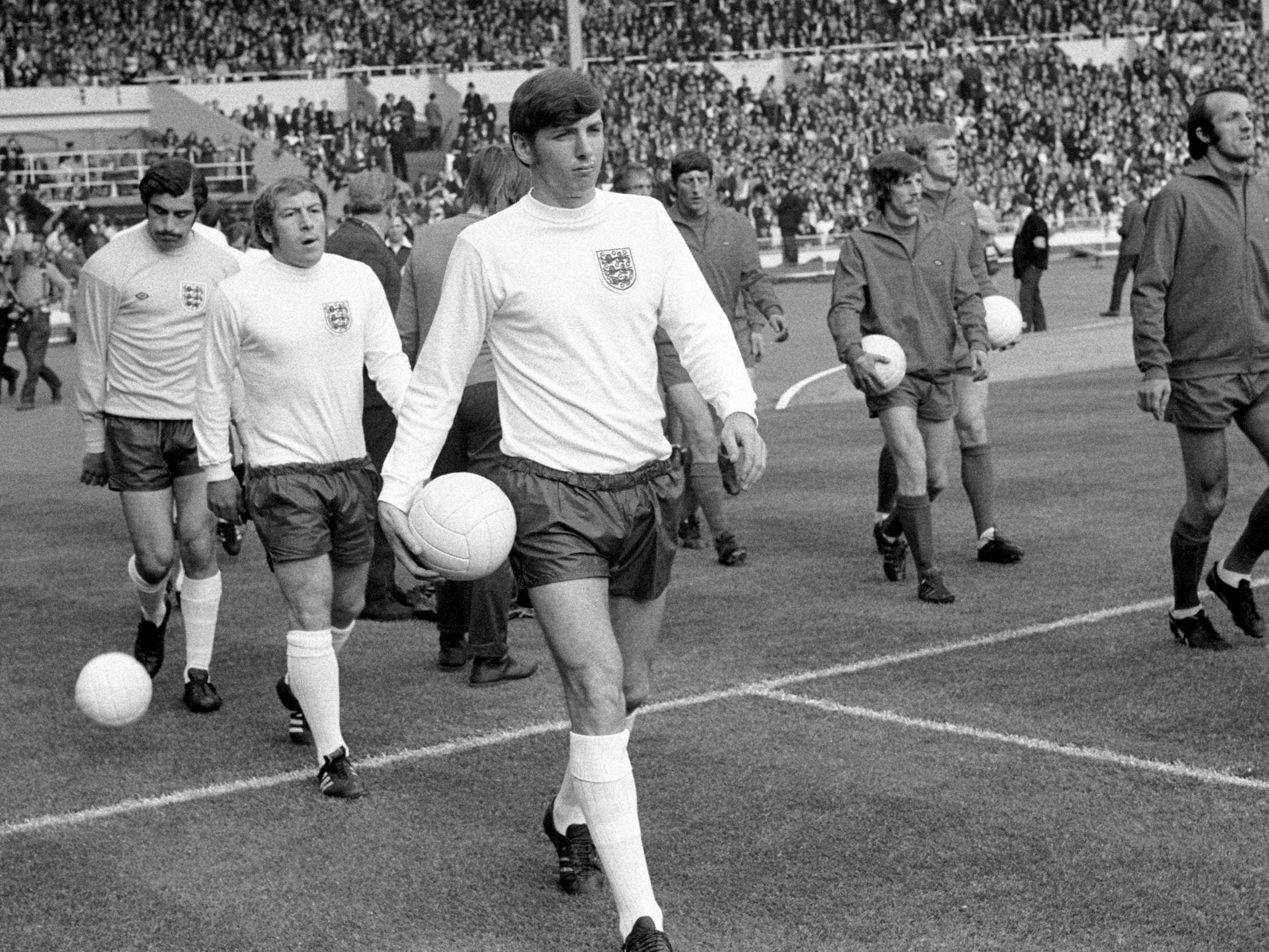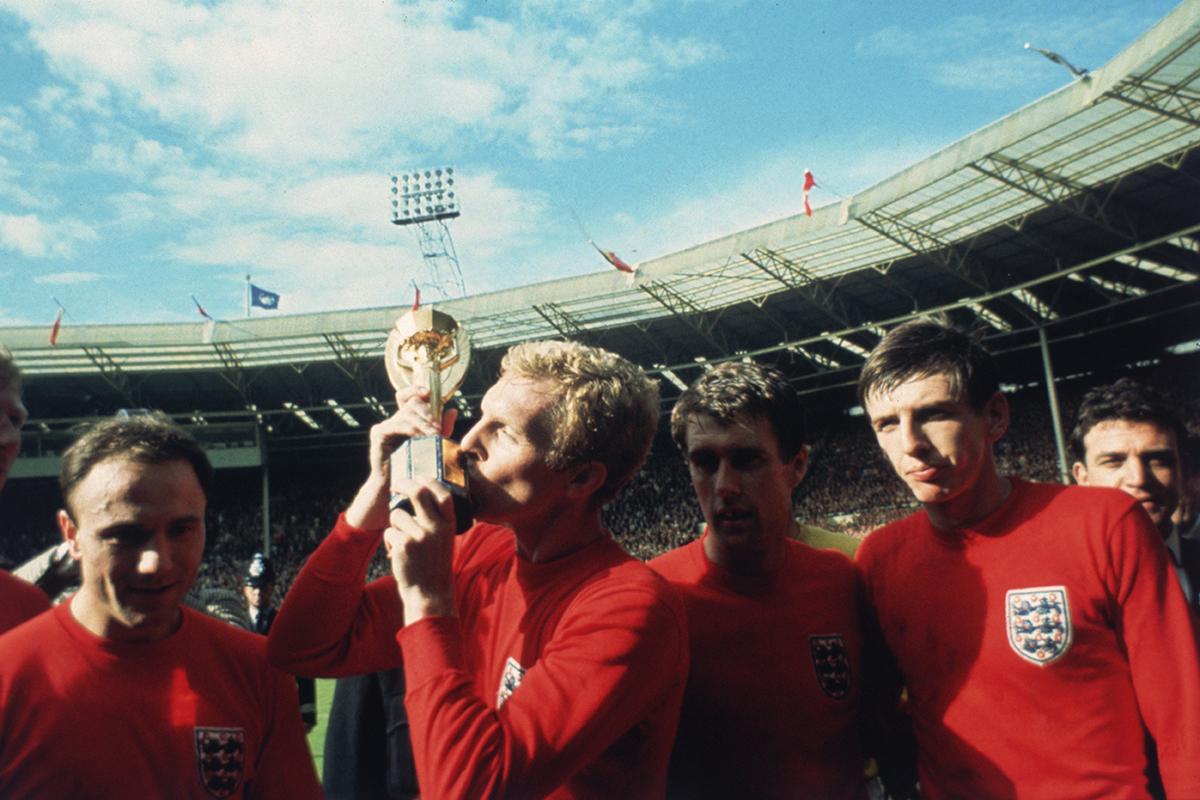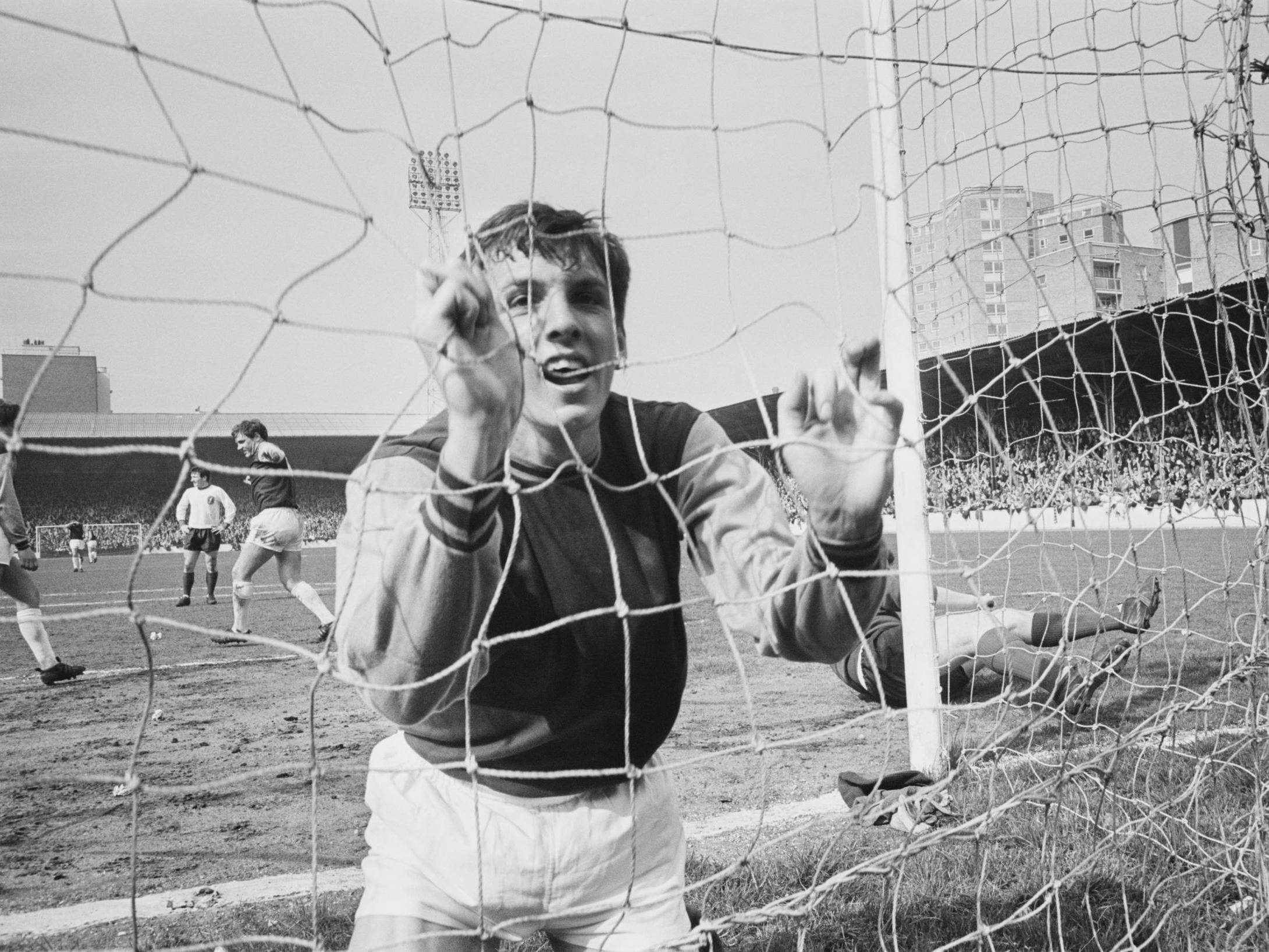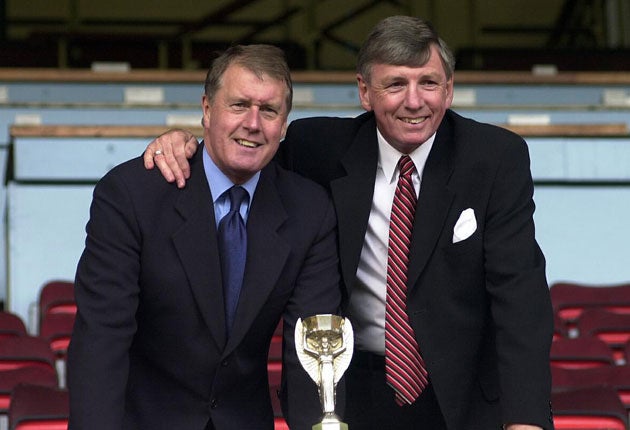Martin Peters: England World Cup hero who was 10 years ahead of his time
He bagged European trophies with West Ham and Spurs but a goal in the 1966 triumph over West Germany was the clever midfielder’s crowning glory

Your support helps us to tell the story
From reproductive rights to climate change to Big Tech, The Independent is on the ground when the story is developing. Whether it's investigating the financials of Elon Musk's pro-Trump PAC or producing our latest documentary, 'The A Word', which shines a light on the American women fighting for reproductive rights, we know how important it is to parse out the facts from the messaging.
At such a critical moment in US history, we need reporters on the ground. Your donation allows us to keep sending journalists to speak to both sides of the story.
The Independent is trusted by Americans across the entire political spectrum. And unlike many other quality news outlets, we choose not to lock Americans out of our reporting and analysis with paywalls. We believe quality journalism should be available to everyone, paid for by those who can afford it.
Your support makes all the difference.It’s curious how eminent football men have been known to despise nicknames, or popular labels, attached to them down the years, no matter how affectionate or complimentary the epithets might have been.
For instance, Sir Matt Busby was known to loathe the use of “Busby Babes” to describe his precociously gifted young Manchester United team in the 1950s, believing the tag to be insufferably glib; Sir Stanley Matthews was embarrassed by “The Matthews Final” being applied to Blackpool’s FA Cup triumph of 1953, pointing out that his teammate Stan Mortensen had supplied a hat-trick on that dramatic sunlit May afternoon at Wembley; and Martin Peters was irked immeasurably by being dubbed “ten years ahead of his time”.
In the case of the 1966 World Cup winner, the offending words emanated from his international boss, Sir Alf Ramsey, not a man given to verbal excess or platitudes of any kind, and certainly the phrase was intended as the warmest of tributes to a performer of the highest calibre who was often overshadowed by the more famous individuals around him, his own mammoth contribution obscured on occasion by its very subtlety.
In fact, Ramsey was (presumably) lauding his fellow southeasterner for his acute intelligence in reading the game and his instinctive tactical awareness but, initially at least, it provoked in the rather straight-laced Peters a profound puzzlement which was exacerbated by the inevitable dressing-room mickey-taking which ensued.
Suddenly he was at the mercy of wags who wanted to know if he inhabited a parallel universe or a different time zone? Eventually his irritation with the well-meant description receded, though maybe not until after his retirement, when perhaps he pondered on what alternative extravagant soundbite might have been visited on his head had West Germany’s Wolfgang Weber not swept home a last-minute equaliser in the most momentous contest in English football history.
The World Cup final at Wembley had unfolded thus: Helmut Haller opened the scoring for the visitors, Geoff Hurst equalised and then Peters made it 2-1 for England. But for Weber’s late intervention it would have been Peters – rather than his West Ham United comrade Hurst, who went on to complete a hat-trick in extra time – being hailed as the national hero, the plunderer of the goal which secured the Jules Rimet trophy. However, that never appeared to bother the clean-cut young fellow from Plaistow whose mode of operation on the field sometimes seemed as unassuming as his manner off it. Yet for all his natural reserve, there was never the slightest doubt about his exceptional quality as a footballer.
Though versatile enough to fill virtually any position with distinction, Peters was essentially an attacking midfielder with a priceless knack of ghosting into opposition penalty areas from deep positions, frequently just in time to net deftly with his head, with which he was brilliant, or either foot.
His method combined stealth with persistence – he was willing to make 19 fruitless dummy runs if the 20th paid off – and he appeared to spy openings that others failed to recognise. Indeed, he possessed a seemingly uncanny ability to capitalise unobtrusively on previously empty space, whether delivering wicked killer passes from unexpected angles and trajectories to the likes of Hurst – in tandem with whom he was at his most menacing for both West Ham and England – or materialising as if from nowhere to apply a deadly finishing touch himself.
Peters was a study in elegant finesse, sleek and serene, tall and athletic, endowed with sumptuously accomplished all-round technique. Fleetingly he might appear detached from the hurly-burly of the action, though that should not have implied a lack of steel or passion. In fact, although his cerebral style was more calculated to win the minds of supporters rather than their hearts, he was as courageous and committed, and endowed with as much stamina, as any of the countless fire-and-brimstone merchants with whom he vied in the midfield trenches.
Hailing from the West Ham heartland of east London, adoring the game as a boy but supporting no particular club, Peters was the son of a lighterman, who guided barges around the Thames docks, and a cafe waitress. During his childhood the family moved to Dagenham and it was there that he blossomed into an exceptional footballer, earning England schoolboy caps, first as a full-back, then as a half-back, the position in which he would mature so impressively.

At this stage a posse of London clubs, including Fulham, Arsenal and Tottenham Hotspur, took an interest in Peters’ progress, but it was West Ham who pounced to add him to their ground staff as a 15-year-old in May 1959. Far removed from the typical wise-cracking East End stereotype, the Upton Park newcomer appeared a tad ambivalent, as if wondering whether he might have been riding riverboats for a living, but he was unfailingly diligent, a pronounced character trait, and he progressed apace under the benevolent guidance of manager Ted Fenton, rising to captain the England youth side.
His fledgling career was given further stimulation in 1961 when the innovative coach Ron Greenwood succeeded Fenton. The thoughtful new boss was much taken both by Peters’ fastidiously professional approach and the cool precision of his work, and on Good Friday 1962 he handed the teenager his top-flight debut at right-half at home to Cardiff City, ironically as a replacement for Hurst, who had yet to make the transition from ho-hum midfielder to top-quality marksman.
It was to prove a red-letter day for West Ham, who won 4-1 to consolidate their accustomed mid-table safety, marking as it did the promotion to skipper of Bobby Moore, destined to become the greatest defender of his generation and the man who would lead an England team containing Peters and Hurst to World Cup glory only four years later.
So efficiently did Peters perform that he retained his place for the remaining four games of the campaign, displaying remarkable versatility by occupying three positions in that sequence, also featuring at left-back and, in the era before substitutes were allowed, taking over in goal from the injured Brian Rhodes.
However, as his career as a creative wing-half gathered further impetus with elevation to the England under-23 ranks, that very adaptability, so useful to managers, hampered him, preventing him from settling seamlessly in a specialist role. Usually if there was an injury it would be Peters who would be moved to a new berth, and in time he wore all 11 shirts as a Hammer.
That was a tribute in itself, but he dreaded becoming a disposable dogsbody, and he feared that had happened when he was dropped from the side after an 8-2 home defeat by Blackburn on Boxing Day 1963. It was inconceivable that he had been the only player to have underperformed, but when the Hammers won the Ewood Park return two days later with the more abrasive Eddie Bovington at right-half, Peters felt ill-used and insecure.
His discontent was heightened as he failed to command a regular slot for the remainder of the campaign, thus missing out on the FA Cup Final victory over Preston North End.
In fact, Greenwood was well aware of his true value, and in 1964/65 he created a new role for the discontented midfielder, playing just behind West Ham’s two strikers, Hurst and Johnny Byrne, in what is today called “the hole”. Thus released to employ his full range of perceptive passing and movement, he flourished luxuriantly, emerging as a fluent and potent attacking link and performing beautifully as the free-flowing Hammers became only the second English team, after Tottenham Hotspur, to lift a European trophy, defeating Munich 1860 by two goals to nil in the Cup Winners’ Cup final at Wembley.
That offered rich consolation for his previous absence at the famous old stadium and set him up for an unforgettable 1965/66 campaign. That term he weighed in with 17 senior goals, and was vastly influential as Greenwood’s men reached the League Cup final, in which they lost to West Bromwich Albion, and a Cup Winners’ Cup semi-final, in which they bowed to Borussia Dortmund.

Best of all, though, came a full England debut against Yugoslavia in May 1966, when Ramsey was toying with the notion of dispensing with at least one winger to play a 4-3-3 formation in the forthcoming World Cup finals on home soil. Peters collected three caps in the run-up to the tournament, then missed the opening game before cementing his place on the left of midfield, with Alan Ball on the right. Thus the so-called “Wingless Wonders” were born and the West Ham man’s emergence had settled the attacking formation which was to lift the game’s premier prize.
Initially Peters’ profile, as he beavered faithfully but unspectacularly behind the frontline, was overshadowed by those of stars such as Moore and Manchester United’s Bobby Charlton. But he entered the spotlight emphatically in the quarter-final against Argentina, setting up the only goal of the game with an exquisitely curled dispatch from his less-favoured left foot which Hurst converted with a perfect glancing header. It was a manoeuvre which caught the South Americans napping, but which was joyfully familiar to anyone who had studied West Ham in recent seasons.
However, his most prominent intervention was reserved for the final when he found space in a crowded German penalty box to volley home a deflected Hurst cross from close range. Only 13 minutes of normal time remained, and for Martin Peters, as the man who appeared to have won the World Cup for England, sporting immortality beckoned. Weber denied him that, but glory untold awaited 30 minutes later as two further strikes from Hurst secured the coveted golden bauble.
In fact, the public exposure which he must have faced as public hero number one would hardly have suited the sedate, home-loving Peters, who spent the night of the final quietly with his wife and baby daughter while most of his teammates went to nightclubs.
Though he had achieved the game’s top honour at the age of 22, Peters remained ambitious, particularly to win the domestic League title, and in the seasons that followed, as it became ever more apparent that he was unlikely to attain that with West Ham, his relationship with Greenwood deteriorated. At one point the manager accused him of playing better for his country than he did for his club, a jibe which he felt was unfair and which left him bitter. Others reckoned he was jealous of the kudos heaped so lavishly on Moore and Hurst, and he denied that, too.
Still he shone at international level, helping England to reach the semi-finals of the 1968 European Championships, but a parting of the ways with West Ham, for whom eventually he scored a century of goals in 364 League and cup outings, became ever more inevitable. Duly, in March 1970, he became Britain’s first £200,000 footballer when he moved to Tottenham Hotspur in a deal which took Jimmy Greaves to Upton Park.

Despite netting on his Spurs debut, his welcome from the notoriously demanding denizens of White Hart Lane, most of whom were still pining for their departed idol, was less than rapturous and that made him feel vulnerable. But after excelling in another World Cup, in Mexico that summer – again scoring England’s second against West Germany, but this time suffering the mortification of quarter-final defeat when the old enemy came from two down to win 3-2 – Peters gradually earned acceptance at his new club.
Eventually settling to link cleverly with marksmen Martin Chivers and Alan Gilzean, he played a major part in winning the League Cup in 1970/71 and 1972/73 and the UEFA Cup in 1971/72, but never managed his heart’s desire of a championship gong, the third-place finish in his first term at the Lane being the closest he came.
In 1972 he succeeded Alan Mullery as captain and established a close rapport with Bill Nicholson, the most revered boss in Spurs’ history. When the Yorkshireman resigned, disillusioned by modern trends in the game and under pressure following a disappointing start to the 1974/75 campaign, Peters tried to stop him, but to no avail.
Upset by what had seemed an unthinkable development – Nicholson was to Spurs what Matt Busby had been to Manchester United and Bill Shankly to Liverpool – the skipper, who had recently collected the last of his 67 England caps in his 31st year, fell out with new manager Terry Neill. While Spurs were engaged in a relegation battle in March 1975, which was ultimately successful, Peters accepted a £50,000 move to Norwich City, just in time to help them clinch promotion to the top flight.
Some cynics suggested Peters was looking for a comfortable pre-retirement billet, but he confounded them with five years of impeccable, supremely influential service under former West Ham colleague John Bond, as the Canaries became an established mid-table presence in the elite tier. He occupied a variety of positions – striker, sweeper, left midfield – and worked tirelessly to encourage the club’s youngsters. In autumn 1979, not far off his 36th birthday, there were even suggestions of an England recall. They came to nothing, but it was no surprise subsequently when the hard-working veteran was voted the finest Norwich player of all time.
In July 1980 he joined Sheffield United as player-coach, but Third Division football proved too frenetic for his measured approach. In January he took over as manager of a team already on the slide and at season’s end was mortified to preside over the first demotion to the basement division in United’s history.
That was the lowest point in his career, too, and he never played another game at Football League level. It was an unfitting exit for a thoroughbred performer who had totalled nearly 900 senior appearances for his four clubs, contributing some 230 goals in the process. He went on to brief spells with Frankston City in Australia and non-League Gorlestown Town, and for many years made a living in insurance, working for a time with Geoff Hurst, always a close friend as well as teammate.
Later there followed corporate hospitality work for Spurs and West Ham, and a stint as a non-executive director at White Hart Lane. There was also after-dinner speaking, during which the man once described as ten years ahead of his time was content to turn the clock back to drily entertaining effect. In 2016, it emerged Peters had been diagnosed with Alzheimer’s disease.
He is survived by wife Kathleen, daughter Leeann and son Grant.
Martin Peters, footballer, born 8 November 1943, died 21 December 2019
Subscribe to Independent Premium to bookmark this article
Want to bookmark your favourite articles and stories to read or reference later? Start your Independent Premium subscription today.
Join our commenting forum
Join thought-provoking conversations, follow other Independent readers and see their replies
Comments